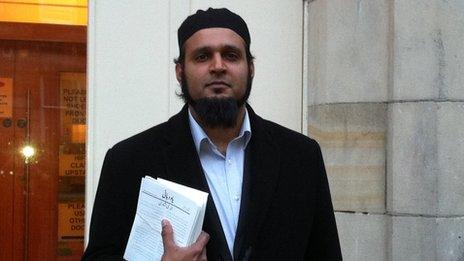Forced marriage parents face jail under new laws
- Published

The new law is expected to acknowledge the differences between forced marriages where there is no consent and arranged marriages
Parents who force their children to marry in England and Wales could be jailed under planned new laws.
Home Secretary Theresa May said forced marriage was an "appalling practice" and criminalising it would send "a strong message that it will not be tolerated". It is already illegal in Scotland.
An estimated 8,000 young women a year are forced into marriages.
But campaigners fear the plan could deter victims from coming forward.
The new law will distinguish between forced marriages, where there is no consent, and arranged marriages where "both parties have consented to the union but can still refuse to marry if they choose to".
A Home Office consultation, which ended in March, was launched at the request of Prime Minister David Cameron, who has said forced marriage is "little more than slavery" and "completely wrong".
The new law will not apply to Northern Ireland, but ministers there will be able to introduce their own legislation, the Home Office said.
Existing laws
Mrs May announced a £500,000 fund to help schools and other agencies spot early signs of a forced marriage.
And a government advertising campaign will highlight an individual person's right to choose whom they marry.A similar law was introduced in Scotland in November giving courts there the power to issue protection orders to those at risk, which, if breached could carry a two-year prison sentence.
Since 2008, courts in England, Wales and Northern Ireland have been able to issue civil orders, under the Forced Marriage Act, to prevent forced marriage or protect victims.
This is an order in a civil court but its breach is punishable with a two-year jail sentence for contempt of court.
Opponents of the idea of criminalising forced marriages fear that victims will be dissuaded from coming forward because they do not want their relatives to end up with a criminal record.
Mr Cameron said as the plans were announced that he had listened to these concerns and there would be a "comprehensive package to identify possible victims, support those who have suffered first hand and, indeed, prevent criminality wherever possible."
He added: "We have spent time with those who work tirelessly to raise and address this issue and I want to send a clear and strong message: forced marriage is wrong, is illegal and will not be tolerated."
Freedom, a charity that campaigns against forced marriage and "dishonour" violence, welcomed the move.
Founder Aneeta Prem said: "Forced marriage is an indefensible abuse of human rights and can result in abduction, serial rape and murder.
"Criminalising forced marriage will send out a powerful message to people that this practice is unacceptable in England and will be dealt with severely."
The Labour peer and chair of trustees for Freedom, Lord Toby Harris, said: "I hope the government put the necessary Bill before Parliament as soon as possible, along with measures to support organisations like Freedom who work to advise and support victims and potential victims."
'Effective framework'
Some say that criminal law already provides punishment for offences that may be committed when coercing someone into matrimony.
"There is already plenty of criminal law to tackle murder, kidnapping, abduction, rape and all the other evil manifestations associated with forcing people into marriage against their will," said Lord Lester, who introduced the Forced Marriage Bill which led to the 2008 Act.
He stated that the family law approach was better than the criminal process which, he said, "has not proved to be an effective way of tackling a major social problem".
Shadow equalities minister Kate Green said she supported "appropriate criminal sanctions to stop more forced marriages and protect victims".
"The Home Office needs to ensure the framework adopted is effective rather than counter-productive," she added.
"Ministers need to demonstrate they are working with victims' groups and experts on the detail to make sure victims have the confidence to come forward and are not put off.
"Also, the legal framework won't make a difference without proper support, prevention, education and enforcement."
- Published1 May 2012

- Published30 March 2012
